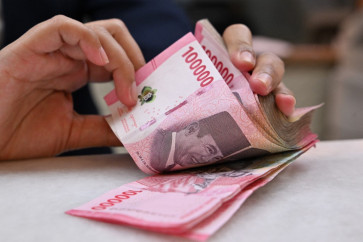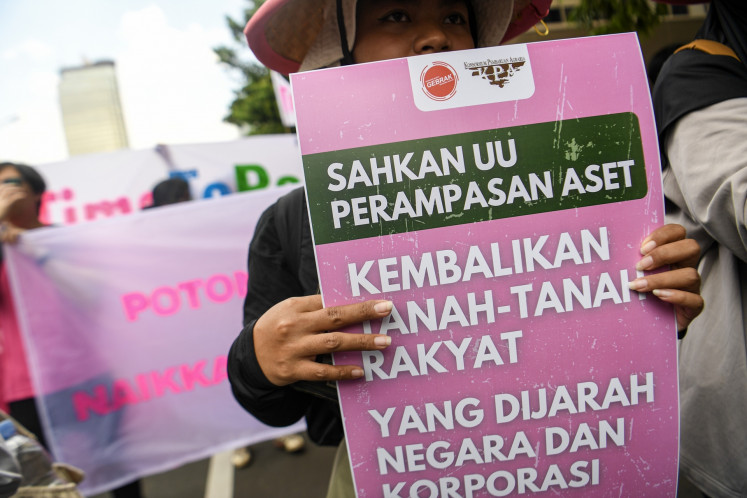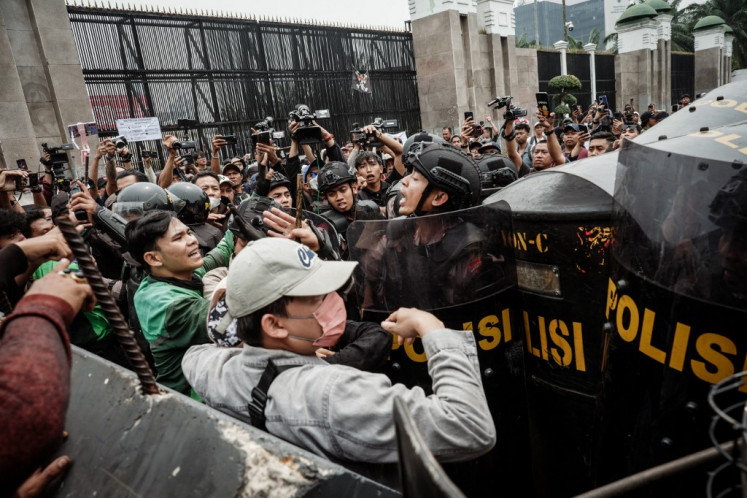Popular Reads
Top Results
Can't find what you're looking for?
View all search resultsPopular Reads
Top Results
Can't find what you're looking for?
View all search resultsThe varied demands of striking laborers
Labor activists demand higher wages and the elimination of contract employment as they march along main thoroughfares in the Thamrin area, Central Jakarta, on Sept
Change text size
Gift Premium Articles
to Anyone
 Labor activists demand higher wages and the elimination of contract employment as they march along main thoroughfares in the Thamrin area, Central Jakarta, on Sept. 16. (JP/Jerry Adiguna)" border="0" height="499" width="332">Labor activists demand higher wages and the elimination of contract employment as they march along main thoroughfares in the Thamrin area, Central Jakarta, on Sept. 16. (JP/Jerry Adiguna)
Labor activists demand higher wages and the elimination of contract employment as they march along main thoroughfares in the Thamrin area, Central Jakarta, on Sept. 16. (JP/Jerry Adiguna)" border="0" height="499" width="332">Labor activists demand higher wages and the elimination of contract employment as they march along main thoroughfares in the Thamrin area, Central Jakarta, on Sept. 16. (JP/Jerry Adiguna)Workers in different cities are still demanding higher wages ahead of the new year. Laborers in the capital have lowered their demand for a Rp 3 million (US$258.60) monthly minimum wage, down from the Rp 3. 7 million they were initially demanding. But they have other agenda as well.
Continued rallies and strikes indicate that workers have additional demands other than just attaining apparently impossible minimum wage hikes â at least in Jakarta, where Governor Joko âJokowiâ Widodo and his deputy Basuki âAhokâ Tjahaja Purnama have said they would not cave in to laborersâ minimum wage hike demands.
Workers have said that aside from higher wages and an end to outsourcing, recent nationwide strikes have targeted the following: strengthening unions across factories and regions; emboldening women workers to speak up and organize; forcing employers to pay the minimum wage; ending extension of casual workers to well over 10 years of service â often paid less than the minimum wage; calling for workers in other areas to demand higher wages, in anticipation of factories relocating to non-industrial areas such as West and Central Java where workers are not organized; and putting pressure on employers to not fire union leaders and others suspected of union activities.
Other union motives may be linked to the upcoming 2014 elections. However, assuming general âpoliticizationâ of labor demands ignores the real concerns of workers.
The minimum wage is theoretically only for single workers with less then one year of service, but penalties for employers paying the same amount to long-time workers and those with families are unclear.
Without a massive strike, many employers would not pay workers the mininum wage that went into effect last January, which was Rp 2.2 million for Jakarta, workers said.
They were among rally participants in late October trying to force Governor Jokowi to meet their demand of a Rp 3.7 million monthly minimum wage for next year. The governor opted to raise the wage to Rp 2.4 million instead.
Ahok had explained that last yearâs increase of 44 percent had been a correction for a minimum wage that was far too low in preceding years and hence next yearâs wage hike shouldnât be so drastic.
At a recent rally, one local union leader named Narso said he was throwing in the towel and going home, seeing no hope of the governor budging.
span class="caption" style="width: 330px;">Labor activists demand higher wages and the elimination of contract employment as they march along main thoroughfares in the Thamrin area, Central Jakarta, on Sept. 16. (JP/Jerry Adiguna) Workers in different cities are still demanding higher wages ahead of the new year. Laborers in the capital have lowered their demand for a Rp 3 million (US$258.60) monthly minimum wage, down from the Rp 3. 7 million they were initially demanding. But they have other agenda as well. Continued rallies and strikes indicate that workers have additional demands other than just attaining apparently impossible minimum wage hikes ' at least in Jakarta, where Governor Joko 'Jokowi' Widodo and his deputy Basuki 'Ahok' Tjahaja Purnama have said they would not cave in to laborers' minimum wage hike demands. At a rally to commemorate May Day in front of Gedung Sate, Bandung, West Java. (JP/Arya Dipa)
L
Workers have said that aside from higher wages and an end to outsourcing, recent nationwide strikes have targeted the following: strengthening unions across factories and regions; emboldening women workers to speak up and organize; forcing employers to pay the minimum wage; ending extension of casual workers to well over 10 years of service ' often paid less than the minimum wage; calling for workers in other areas to demand higher wages, in anticipation of factories relocating to non-industrial areas such as West and Central Java where workers are not organized; and putting pressure on employers to not fire union leaders and others suspected of union activities.
Other union motives may be linked to the upcoming 2014 elections. However, assuming general 'politicization' of labor demands ignores the real concerns of workers.
The minimum wage is theoretically only for single workers with less then one year of service, but penalties for employers paying the same amount to long-time workers and those with families are unclear.
Without a massive strike, many employers would not pay workers the mininum wage that went into effect last January, which was Rp 2.2 million for Jakarta, workers said.
They were among rally participants in late October trying to force Governor Jokowi to meet their demand of a Rp 3.7 million monthly minimum wage for next year. The governor opted to raise the wage to Rp 2.4 million instead.
Ahok had explained that last year's increase of 44 percent had been a correction for a minimum wage that was far too low in preceding years and hence next year's wage hike shouldn't be so drastic.
At a recent rally, one local union leader named Narso said he was throwing in the towel and going home, seeing no hope of the governor budging.
Labor's demand for Rp 3.7 million was based on a new, longer list of 84 components of living that the minimum wage should take into consideration, which has not been approved by the National Wage Council, which set 60 components.
'It's not worth it,' said Narso. A slight increase would only benefit those working less than a year, he said, while those who had been working for 10 or 20 years like him would be paid 'maybe Rp 15,000 more', barely enough to cover the impact of inflation on groceries. And if the governor had agreed to Rp 2.5 million this would have subjected workers to income tax.
What workers should be demanding, Narso said, was wage increases in accordance with length of service.
Around him, his colleagues' faces began to be shadowed with doubt.
The men and women all wore the neon-green jackets like Narso, being members of the Federation of Indonesian Chemical Workers ' one of reportedly 90 federations of unions.
'How is anyone supposed to negotiate with 90 federations?' one observer said. A cafe patron laughed over the workers' list of demands: 'A phone, a jacket, a motorcycle? Get real!'
In the heated days of strikes and rallies, workers and employers had different standards, while workers also had other aims. Public opinion was divided between those who feared further discouragement to investment due to higher costs and seemingly more militant labor and those stunned that Indonesian workers were fighting for barely Rp 3 million per month in rapidly developing industrial areas.
'We just gali lobang tutup lobang,' said a woman worker ' dig a hole and close a hole with debt. Many laborers take out loans to survive, feed families or to buy sleek new items on credit such as smart phones; but interest for loan sharks can reach 50 percent, union leaders say.
According to employers, slowing economic growth, low productivity and all kinds of levies make it impossible to pay workers the wages they've been demanding.
Your Opinion Matters
Share your experiences, suggestions, and any issues you've encountered on The Jakarta Post. We're here to listen.
Thank You
Thank you for sharing your thoughts. We appreciate your feedback.
Share options
Quickly share this news with your network—keep everyone informed with just a single click!
Gift Premium Articles
to Anyone
Share the best of The Jakarta Post with friends, family, or colleagues. As a subscriber, you can gift 3 to 5 articles each month that anyone can read—no subscription needed!
Continue in the app
Get the best experience—faster access, exclusive features, and a seamless way to stay updated.









